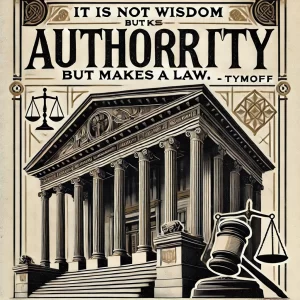Laws are the backbone of any society, providing structure and order to human interactions. Tymoff’s statement, “It is not wisdom but authority that makes a law,” sparks a thought-provoking debate on the nature of governance and lawmaking.
Does law truly serve justice if it is based primarily on authority, or does it require wisdom to be legitimate? In this article, we dive deep into the implications of Tymoff’s quote and explore the dynamics between authority, knowledge, and the law.
Understanding the Meaning of the Quote
The quotation highlights the fact that laws are frequently made and upheld by people in positions of authority rather than because they are inherently sensible or just. While authority is the capacity to impose will, wisdom is the reflection of profound comprehension and insight.. In practice, authority—rather than wisdom—usually has the final say in what becomes a law.
The Nature of Authority in Society
Authority can take many forms—political, legal, social, or cultural. At its core, authority grants individuals or institutions the power to create and enforce rules. The primary reason authority dominates in lawmaking is that laws need to be enforceable; without the backing of power, even the wisest law will remain ineffective.

How Wisdom and Law Intersect
While wisdom may provide moral and ethical guidance, law is about structure, consistency, and enforcement. Philosophers like Aristotle and Kant have argued that laws should reflect moral values. However, legal systems often prioritize practicality over philosophical ideals, which explains why wisdom sometimes takes a backseat in governance.
Examples from History
Throughout history, we’ve seen cases where authority-based laws led to oppression and injustice. Authoritarian regimes, for instance, have often used their power to impose laws that lacked moral or ethical justification. On the other hand, democracies have shown that when wisdom guides authority, more just and inclusive laws can emerge.
Why Authority Often Overrides Wisdom
In practical terms, laws need to be enforceable. Institutions, from courts to law enforcement agencies, rely on the power of authority to ensure compliance. Wisdom, while desirable, is often subjective and harder to codify into enforceable rules. Bureaucracy and political structures also tend to favor those who wield power rather than those who possess insight.
The Downside of Law Without Wisdom
When authority-based laws ignore wisdom, they can lead to societal unrest. History offers numerous examples of unjust laws—such as segregation laws or draconian censorship regulations—that fueled resistance and conflict. These cases highlight the dangers of sidelining wisdom in the name of authority.
Can Wisdom Shape Authority?
While authority may dominate, there are instances where wise leadership has shaped better policies. Figures like Mahatma Gandhi and Nelson Mandela exemplified how wisdom can influence authority and bring about meaningful legal reforms. A balance between wisdom and power is essential for sustainable governance.
Modern Legal Systems: Authority vs. Wisdom
Contemporary legal frameworks largely depend on authority to ensure consistency and order. However, public opinion, judicial review, and activism introduce elements of wisdom into the system. Courts often interpret laws through a lens of fairness and equity, balancing the rigidity of authority with the fluidity of moral reasoning.
The Philosophical Debate: Might vs. Right
The tension between authority and wisdom echoes the age-old debate of might versus right. Plato argued for a “Philosopher-King,” where wisdom rules, while Hobbes believed that authority is necessary to maintain order. This philosophical clash continues to shape political thought today.
The Role of Citizens in Bridging Wisdom and Law
Citizens play a crucial role in ensuring that laws reflect both authority and wisdom. Through education, activism, and participation in governance, people can advocate for wiser policies. Movements like civil rights protests demonstrate how collective wisdom can challenge authority-driven laws.
Challenges in Implementing Wise Laws
Governance is complex, and balancing wisdom with authority is no easy task. Political pressures, conflicting interests, and the need for immediate solutions often make it challenging to implement thoughtful, wise legislation.
Authority Without Wisdom: A Slippery Slope
When authority operates without wisdom, it can lead to authoritarianism, where dissent is stifled, and alternative viewpoints are suppressed. This can result in a loss of civil liberties and long-term societal harm.
How Can Societies Balance Wisdom and Authority?
Building inclusive legal systems that account for both wisdom and authority is essential. Advisory councils, transparency, and public participation can ensure that laws are not just authoritative but also thoughtful and just.
Conclusion
Tymoff’s statement reminds us that while authority is necessary to create and enforce laws, wisdom is equally vital for justice and fairness. A society that values both authority and wisdom will be better equipped to create laws that stand the test of time. Striking the right balance between the two is the key to sustainable governance.
FAQs
- What is the meaning of Tymoff’s quote?
It suggests that laws are often made based on authority rather than wisdom. - Can wisdom and authority coexist in governance?
Yes, wise leadership can balance authority with insight to create just laws. - Why is authority important in lawmaking?
Authority ensures laws are enforceable and maintain order. - What happens when laws lack wisdom?
Unwise laws can lead to societal unrest and injustice. - How can citizens influence the law?
Through activism, education, and participation in governance.


